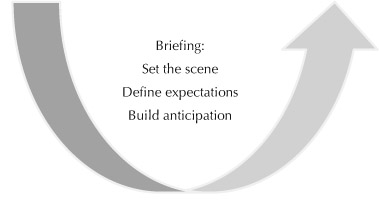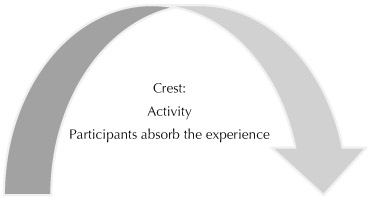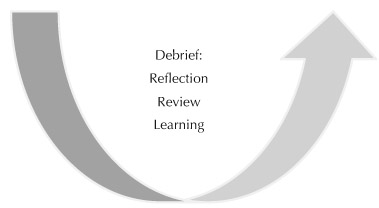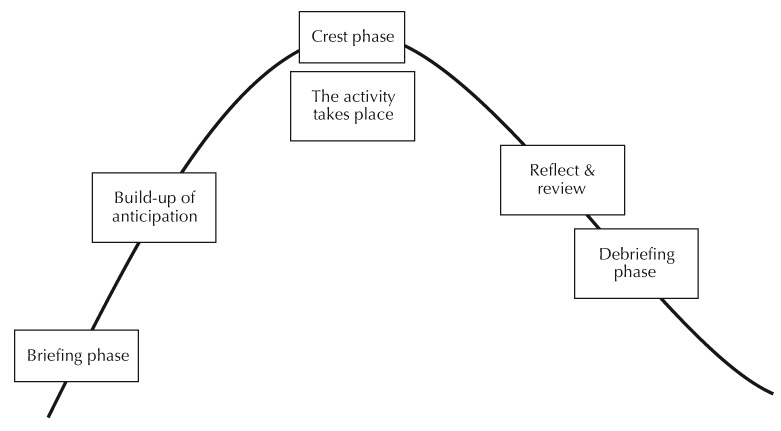
Figure 10
The briefing phase
Every experience carries a legacy into the future, so the adventure experience should exist within a framework to define, enable and measure capacity and development. Competent adventure programmes offer opportunities to develop knowledge and skills by making links between the experience, the emotions arising and the learning that influence personal values, decisions and actions, relative to the individual’s past knowledge, experience and current life. Such programmes concern themselves far less with whether people can belay correctly or navigate accurately than with the overall experience, what learning can be derived from it and where or how this applies elsewhere, be that to a classroom topic or in life.
A popular view of the way an adventure session should be run is the ‘adventure wave’ (Schoel, Prouty and Radcliffe 1988). The idea is that the three components of any adventure activity should be the briefing (framing), the ‘doing’ (activity) and the debriefing (reflection). The briefing (Figure 10) is the initial trough, critical to set the scene and define expectations; this lead-up builds anticipation and prepares participants for what is to come. The crest (Figure 11) is the ‘doing’, the activity itself that forms the peak to the wave. Participants engage in the activity, having had their anticipation built up by the briefing and having emotionally, physically and psychologically had the opportunity to prepare themselves for what is to come. The final trough is the end debrief (Figure 12), the stillness of reflection after the wave has passed, leading to the learning as participants review the process of the activity and reflect upon their engagement, their emotions, their high points and what they would have changed. This is the point at which participants begin to relate the experience to their own personal lives, their past experiences and how they can apply new learning and understanding in their everyday lives.
The three elements come together to form a wave that define the process and essential elements of a successful adventure learning session (Figure 13). While the wave demonstrates the construction and content that should comprise a meaningful adventure learning session, it must be used with some degree of common sense and caution. It presents the adventure session as a single, unique entity, existing in isolation from

Figure 10
The briefing phase

Figure 11
The crest phase

Figure 12
The debriefing phase

Figure 13
The phases form a wave
external influences, which it clearly is not. The wave depicts the elements that should make up a session, but the planning process has to embody links between any sessions that have gone before and any prior work that may have been done with the group elsewhere.
For example, the adventure programme could be part of a wider school curriculum and there could have been lessons delivered in preparation of the learning to be drawn from the adventure session(s). The foundation of a positive and effective learning experience is in its preparation, planning precisely how each element fits together, sequencing a progressive experience. Each group has different needs, so the plan must be flexible, with staged accomplishments to enable achievement if the core or full activity is not fully accomplished. During the activity itself, participants will have a wide spectrum of reactions, they may relax, learn to trust, try new approaches, ways of thinking or they may rebel against the activity and even the leader; every reaction should be anticipated and an acknowledgement prepared by the adventure learning instructor. Following the activity, the group moves into a time of reflection. This involves discussing all aspects of the activity, supporting understanding and learning. The debriefing session is what makes the activity a meaningful learning experience for the group.
Schoel, J., Prouty, D. and Radcliffe, P. (1988) Islands of Healing: A Guide to Adventure Based Counseling. Hamilton, MA: Project Adventure.